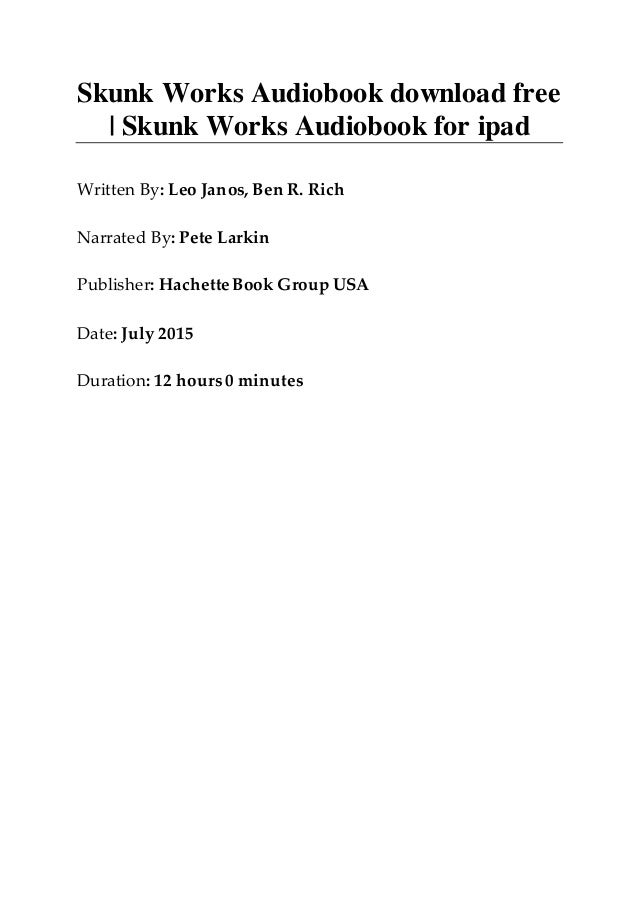Overview
From the development of the U-2 to the Stealth fighter, Skunk Works is the true story of America's most secret and successful aerospace operation. As recounted by Ben Rich, the operation's brilliant boss for nearly two decades, the chronicle of Lockheed's legendary Skunk Works is a drama of Cold War confrontations and Gulf War air combat, of extraordinary feats of engineering and human achievement against fantastic odds.
Here are up-close portraits of the maverick band of scientists and engineers who made the Skunk Works so renowned. Filled with telling personal anecdotes and high adventure, with narratives from the CIA and from Air Force pilots who flew the many classified, risky missions, this book is a riveting portrait of the most spectacular aviation triumphs of the twentieth century.
'Thoroughly engrossing.' —Los Angeles Times Book Review

Chuck Yeager, Leo Janos. Bantam Books, 1986 - Biography & Autobiography - 342 pages. 4 Reviews #1 MULTI-MILLION-COPY BESTSELLER - A one-of-a-kind portrait of a true American hero: General Chuck Yeager 'The secret of my success is that I always managed to live to fly another day.' Learn more about Leo Janos. Browse Leo Janos’s best-selling audiobooks and newest titles. Discover more authors you’ll love listening to on Audible. Leo Janos is the author of Celebrity Teddy Bear Book (3.00 avg rating, 1 rating, 0 reviews, published 1987), Crime Of Passion (0.0 avg rating, 0 ratings.
Leo Janos, a former speechwriter for President Lyndon Johnson whose ghostwriting talents were displayed in legendary test pilot Chuck Yeager's best-selling autobiography, has died. He was 74.
Mr. Janos died of cancer Friday at his Los Angeles home, his wife, Bonnie, said Saturday.
A longtime correspondent for Time magazine and a freelance non-fiction writer, Mr. Janos (pronounced Janice) sent his career into the stratosphere in 1985 with 'Yeager: An Autobiography.' Co-written with the World War II ace fighter pilot who in 1947 became the first person to break the sound barrier, the book sold more than a million copies in hardcover.
Mr. Janos' first response to his agent's pitch, he told a Los Angeles Times reporter in 1987, was, 'Good God, that was 30 or 40 years ago. Why would I want to do a book about him?' But then, he said, he realized that 'people were hungry for a hero.'
Critics praised the book's lively narrative and its structure, which interwove Yeager's voice with recollections of family, friends and colleagues.
Lyndon Johnson Final Days
Mr. Janos caught Johnson's attention soon after he went to work for the U.S. Information Agency in 1965 as an editor for Ameryka magazine, a cultural exchange publication aimed at readers in the Soviet bloc.
He proposed an interview with the president and wrote a mock exchange with questions and suggested answers and submitted it to Bill Moyers, then Johnson's press secretary. Moyers liked it so much he told Mr. Janos to run it, but he didn't alert the president, Mr. Janos told an interviewer in 2004. Best mac utilities free.
Lyndon B Johnson Final Years
'Johnson just woke up one day in the center of glowing praise about his reaching out directly to Soviet citizens with warmth and understanding,' Mr. Janos told his college alumni magazine.

It was 1966, when Johnson was facing criticism for his handling of the Vietnam War as well as his domestic policies. When the president found out Mr. Janos had written the piece, he hired him as a speechwriter, a post he held until 1968.
For the next 10 years Mr. Janos was a correspondent for Time magazine, first in Washington and then in Houston, where he covered NASA and space missions.
He moved to Los Angeles in 1973 and covered entertainment for Time before leaving the magazine to write freelance articles.
Before the Yeager book was published, it was serialized in Playboy magazine, which led to Mr. Janos' next contract, a seven-figure deal with Bantam to help Hugh Hefner write his autobiography.

Mr. Janos spent three years interviewing the Playboy founder and sifting through diaries and files, but the publisher eventually gave up on the collaboration.
'I just ran out of gas,' Mr. Janos told the Chicago Tribune in 1993. 'It really wasn't that his life wasn't fascinating. God knows it was. But I just couldn't afford to stay on the project.'

Chuck Yeager Biography Book
The last story Mr. Janos was writing was his own, his wife said. He had been writing his memoirs but had not finished.
